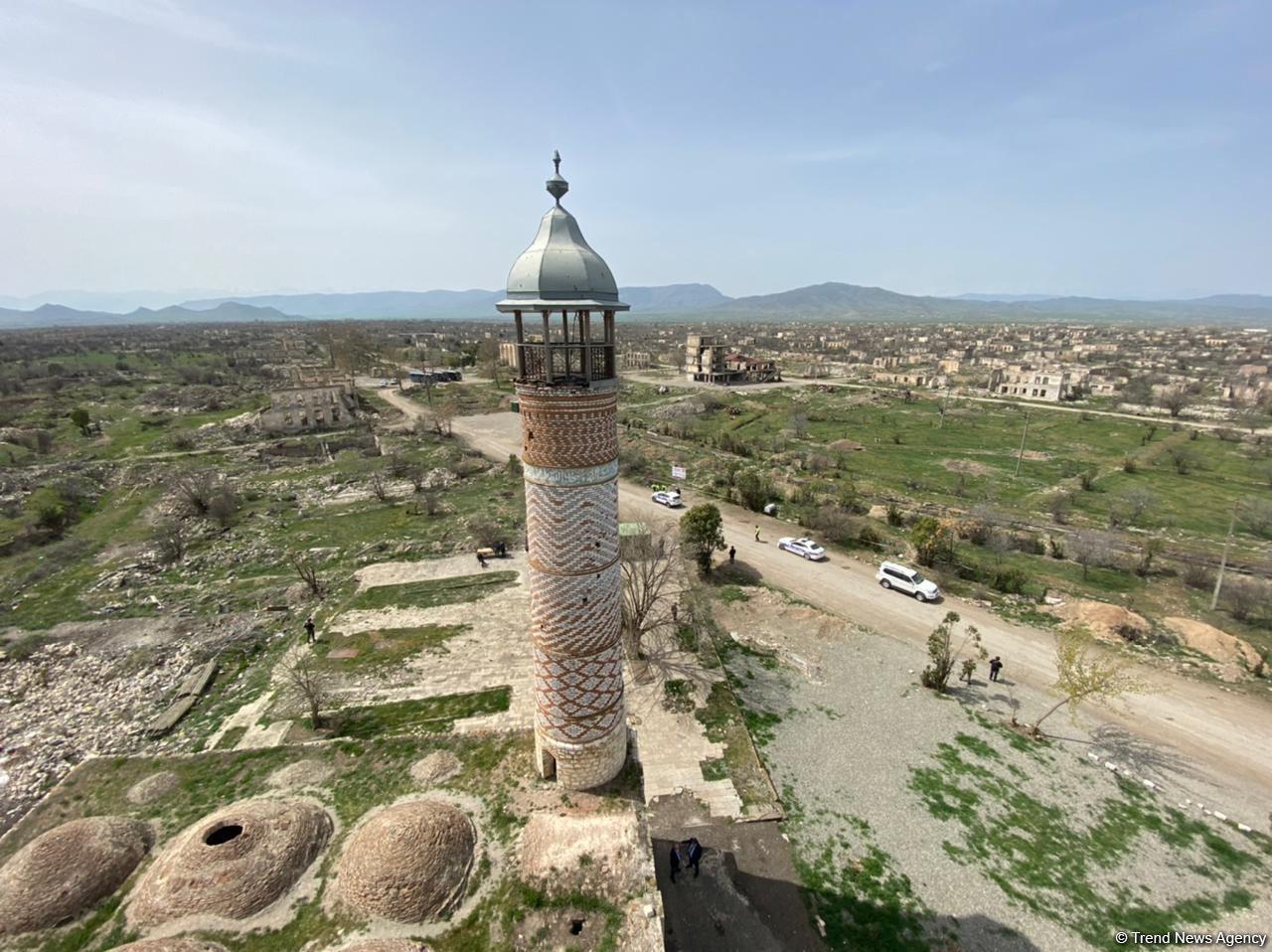Azerbaijan to begin rebuilding mosques in liberated Aghdam soon

The restoration of the Juma and Giyasli mosques in Azerbaijan's liberated Aghdam region will begin soon, Trend has reported.
Azad Jafarli, head of the State Service for the Protection, Development and Restoration of Cultural Heritage, made the remarks during the conference on "Architectural heritage of Karabakh and Eastern Zangazur: Problems of restoration, protection and use", held in Baku on April 21.
He noted that archaeological work continues in Uzarliktapa settlement of the Middle Bronze Age on the outskirts of Aghdam city. He added that after the completion of this work, it's planned to implement infrastructure projects there.
"Totally, more than 2,600 historical and cultural monuments, 706 of which have state registration, are located in the liberated territories," he said.
Jafarli stressed that the Shusha fortress, Khudafarin bridges, Ganjasar, Khudavang monasteries, Gutlu Musa tomb, and Azykh cave located in Karabakh and East Zangazur are historical and cultural monuments of world importance.
"The monument to Uzeyir Hajibayli, the bust and mausoleum of Molla Panah Vagif, and the House-Museum of Bulbul have already been restored,” he said.
Moreover, he added that the restoration of the Ashaghi and Yukhari Govhar Agha and Saatli mosques in Shusha is underway.
Speaking at the conference, Azerbaijani Deputy Education Minister Firudin Gurbanov stated that a total of 74 mosques, more than 800 cemeteries and 993 educational institutions were destroyed in Karabakh and East Zangazur during the Armenian occupation. He added that there were about 750 cultural monuments in these territories.
Armenian forces occupied Aghdam in 1993 during the first Karabakh war. Azerbaijan reclaimed control of the region following a trilateral ceasefire agreement signed on November 10, 2020, which ended the 44-day second Karabakh war.
According to the general plan, the territory of Aghdam city is 1,750 hectares, and gardens will be created on a 2,450-hectare area around the city. The city's smart social infrastructure will be established, and 15 schools and kindergartens will be built.
Initially, a big forest park stretching 125 hectares will be laid out in Aghdam. The Aghdam Canal, which is being restored, will pass through the city and water will drain into the lake that will be created here.
Aghdam's Industrial Park is already under construction as part of the general plan. It will be divided into social and technical zones, with food, light industry, services, and large industrial enterprises. In the Industry Park, bases for the sale of building materials and a vehicle park will be established.
It is planned to establish enterprises producing building materials, meat and dairy factories, wine and feed production, fertilizer production and processing, agricultural product packing, and canned fruits and vegetables.
Because of its strategic and geographical location, Aghdam has the potential to become an industrial center for the Karabakh region.
Armenia razed to the ground, looted, and burned down houses, public buildings, schools, kindergartens, hospitals, industrial enterprises, and even cemeteries during its nearly 30-year occupation of Azerbaijani territories. Over 500 Azerbaijani cemeteries in Armenia have been destroyed. In addition, the monitoring conducted showed that 95 percent of 706 state-registered historical and cultural monuments in the liberated territories have been eliminated. Moreover, Armenians damaged Azerbaijan’s nature, biodiversity and the whole ecosystem, deliberately setting fire to 100 hectares of land.
The trilateral ceasefire deal signed by the Azerbaijani, Russian and Armenian leaders on November 10, 2020, ended the three-decade conflict over Azerbaijan’s Karabakh region which along with the seven adjacent districts came under the occupation of Armenian armed forces in the war in the early 1990s.
On January 11, 2021, the Azerbaijani, Russian and Armenian leaders signed the second statement since the end of the 44-day war. The newly-signed statement was set to implement clause 9 of the November 2020 statement related to the unblocking of all economic and transport communications in the region.
On November 26, 2021, the three leaders signed a statement and agreed on a number of issues, including the demarcation and delimitation of the Azerbaijani-Armenian border by late 2021, some points related to humanitarian issues and the issue of unblocking of transport corridors which applies to the railway and to automobile communications.
On December 14, 2021, during the Brussels meeting, organized between the Azerbaijani and Armenian leaders at European Council President Charles Michel's initiatives, the sides reaffirmed their commitment to the conditions agreed in the Sochi meeting. Both sides agreed to establish a temporary working group on the delimitation of the Armenian-Azerbaijani border.
On April 6, 2022, Aliyev, Pashinyan and Michel met in a trilateral format in Brussels again. Both Aliyev and Pashinyan expressed a willingness to work quickly toward a peace agreement between their countries. To that end, it was decided to instruct foreign ministers to begin work on drafting a future peace treaty that would address all of the issues.
At the same time, it was also agreed to convene a Joint Border Commission by late April. The Joint Border Commission's mandate will be to: delimit the bilateral border between Armenia and Azerbaijan, and ensure a stable security situation along and in the vicinity of the borderline.
---
Follow us on Twitter @AzerNewsAz
Here we are to serve you with news right now. It does not cost much, but worth your attention.
Choose to support open, independent, quality journalism and subscribe on a monthly basis.
By subscribing to our online newspaper, you can have full digital access to all news, analysis, and much more.
You can also follow AzerNEWS on Twitter @AzerNewsAz or Facebook @AzerNewsNewspaper
Thank you!
